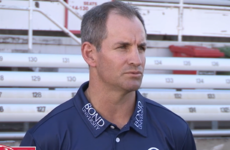IN THE THICK of an enthralling discussion about his own approach to coaching and philosophy around building culture on the inaugural episode of How To Win At Dominoes, Gary Keegan hones in on the seismic shifts he helped to bring about in Irish boxing early this century.
Historically, boxing has been the most lucrative sport for Irish Olympians as it has provided just over half (16) of our total 31 medals. And in recent times, boxers from these shores have been sent to Games with high expectations of collecting a prize to bring home to show for their efforts.
Yet, forging a link between historical success and the 21st century was no straightforward job even after the high of the silver and gold won in Barcelona. The decade that followed was to be a sharp comedown for Irish boxing.
The host of The42′s all new coaching podcast, How To Win At Dominoes, Shane Keegan spends the best part of an hour of episode one picking the brains of a man who was integral to bringing high performance to Irish sport. Crucially, probing into how Gary Keegan set about turning the fortunes of Irish boxing on their head.
“In many ways the culture had devolved, based on our experience of defeat – our experience of success or not success on the international stage,” says the former performance director the inaugural episode of How To Win At Dominoes, released this week.
The culture devolved out of our learning and growth not being stimulated by being exposed to better teams, exposure to other coaches, for long periods of time, where we could really engage with what ‘good’ looks like.
“And I think part of our experience by way of failure in the international arena had affected our belief in ourselves and to protect ourselves we started to look for excuses. So in many ways we were saying ‘the other teams were bigger than us, they had bigger talent pools and they had more resources, better facilities, we had a lot less’.
“Because when we stepped into our national gym it had seven punch bags and one ring and it was just a big open space. So our reality had remained very traditional in our ways and yet the world had moved on and the sport itself had changed…”
He adds:
“We were still very traditionalist and we were using a lot of traditional methods. That excuse culture and some of our limiting beliefs. We had practices that were holding us back, that we didn’t really understand because we didn’t measure the affect of some of our ways and our practices. Only when we came in to begin to look at that – ‘what is currently limiting us from being successful and what is helping us to be successful?”
A key tenet of building standards back up in the sport is alluded to by Keegan, identifying where the benchmarks were. Then, with a blend of determined optimism and no little pragmatism, he and his coaching team had to figure out how an Irish team could replicate an approach.
“It’s important to point out that we had a very clear ambition to begin with,” Keegan says of his work with Billy Walsh and Zaur Antia among others.
“‘To consistently stand on world podiums.’ And that meant there was no point in looking at people who weren’t doing that…”
That criteria took their gaze to the USA, Russia and Cuba. In America, they figured there was no secret sauce at play, simply a great volume of excellent fighters. So they turned to what appeared to be similar setups in very different climates.
“Cuba was very systemised. Why? Well, they went to the Soviet Union, pulled a load of coaches out, got them to help them build a system in Cuba and then deported them back to the Soviet Union and set up a system that was beating the Soviet Union.
“We chose not (to follow up with) Cuba for a couple of reasons. They box with flair, they box like a dance; a lot of rhythm, a lot of flair, a lot of different styles and that’s too hard to replicate.
“The second reason was they don’t allow you to train with their senior team. That was no use to us…”
Training with a junior squad, a shadow of the top competitors carried no interest for Keegan who wanted Irish boxers to work in an environment where they could absorb every last drop of international quality.
“Russia became hugely important to our development. So did Germany, so did France. We had to take small steps before we could take bigger steps, but we always had the ambition to be with the best, to be exposed to the best because we wanted to be among the best.
You can’t avoid the best in case you’re found out. You have to be right in there to see where the learning is available to you.”
How To Win At Dominoes is exclusively available to The42 Members, which costs €5 per month or €42 per year. Sign up here and get immediate access to this podcast and five others, all of our podcast archives, and lots more great membership benefits.














It wrecks my head that Stephen Ireland scored the first goal for Ireland in Croker. I couldn’t think of a player worse than him to score it.
@Ned Flanders: Roy Keane would be a good candidate for you.
18/20, not too bad, definitely guessed a couple.